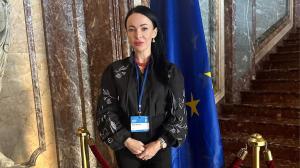European Parliament Elections: Consequences of Macron's Party's Defeat and Overall Situation – Alona Lebedieva
KYIV, UKRAINE, June 11, 2024 /EINPresswire.com/ -- This weekend, the European Parliament elections took place, shaping the new political landscape of the European Union. The results demonstrate significant shifts in the distribution of political forces, which may substantially impact the EU's legislative and economic policies in the next five years.
"France's election results brought unexpected outcomes. The loss of key positions by the presidential party has intensified internal debates about the country's future in the EU. The dissolution of the parliament following the defeat may indicate a crisis in the political system, where parties are unwilling to work under new political conditions and prefer dissolution over reform," said Alona Lebedieva, owner of the Ukrainian multi-industry investment group of companies "Aurum Group."
She believes that the defeat has called into question Macron's ability to effectively govern the country and maintain the political center. This opens opportunities for his opponents to criticize his policies and propose alternatives, which may increase government instability.
Meanwhile, the results of the Hungarian elections confirm a smaller yet strong support for the ruling party "Fidesz," which traditionally holds a Eurosceptic stance.
"This further intensifies tensions between Hungary and the European Commission, especially on issues of human rights and the rule of law. The rise in support for parties critical of the EU highlights the challenges the EU faces in ensuring the unity of its members. Orban will continue to use his representation in the European Parliament to block or slow down initiatives aimed at restricting his policies," Lebedieva suggests.
At the same time, far-right parties, particularly the Identity and Democracy (ID) group and the European Conservatives and Reformists (ECR), have gained more seats than expected.
"This strengthens their ability to influence the political agenda, especially on issues of migration and sovereignty. Such a result reflects the growing dissatisfaction of voters with the general EU integration policy and the rise of nationalist sentiments. Among the far-right parties there are many who openly or covertly support Russia, or have done so recently," she emphasizes.
However, there will not be a pure right-wing majority in the European Parliament, regardless of whether the three right-wing forces can find enough new representatives. This is impossible for several reasons, one of which is Ukraine.
"Pro-European parties insist on maintaining sanctions against Russia and continuing financial aid to Ukraine, which opposes the ambitions of some right-wing factions to weaken them. Such a difference in views on Ukraine makes it difficult to form a single right-wing coalition," Lebedieva notes.
She believes that the results of the elections to the European Parliament testify to the strengthening of the polarization of political forces, which, although it complicates decision-making, also reflects the diversity of opinions and approaches that exist in modern Europe.
"It is extremely important that the newly elected members of parliament are able to find a balance between the desire for greater integration and the need to preserve the national identity and autonomy of the member states," she concluded.

"France's election results brought unexpected outcomes. The loss of key positions by the presidential party has intensified internal debates about the country's future in the EU. The dissolution of the parliament following the defeat may indicate a crisis in the political system, where parties are unwilling to work under new political conditions and prefer dissolution over reform," said Alona Lebedieva, owner of the Ukrainian multi-industry investment group of companies "Aurum Group."
She believes that the defeat has called into question Macron's ability to effectively govern the country and maintain the political center. This opens opportunities for his opponents to criticize his policies and propose alternatives, which may increase government instability.
Meanwhile, the results of the Hungarian elections confirm a smaller yet strong support for the ruling party "Fidesz," which traditionally holds a Eurosceptic stance.
"This further intensifies tensions between Hungary and the European Commission, especially on issues of human rights and the rule of law. The rise in support for parties critical of the EU highlights the challenges the EU faces in ensuring the unity of its members. Orban will continue to use his representation in the European Parliament to block or slow down initiatives aimed at restricting his policies," Lebedieva suggests.
At the same time, far-right parties, particularly the Identity and Democracy (ID) group and the European Conservatives and Reformists (ECR), have gained more seats than expected.
"This strengthens their ability to influence the political agenda, especially on issues of migration and sovereignty. Such a result reflects the growing dissatisfaction of voters with the general EU integration policy and the rise of nationalist sentiments. Among the far-right parties there are many who openly or covertly support Russia, or have done so recently," she emphasizes.
However, there will not be a pure right-wing majority in the European Parliament, regardless of whether the three right-wing forces can find enough new representatives. This is impossible for several reasons, one of which is Ukraine.
"Pro-European parties insist on maintaining sanctions against Russia and continuing financial aid to Ukraine, which opposes the ambitions of some right-wing factions to weaken them. Such a difference in views on Ukraine makes it difficult to form a single right-wing coalition," Lebedieva notes.
She believes that the results of the elections to the European Parliament testify to the strengthening of the polarization of political forces, which, although it complicates decision-making, also reflects the diversity of opinions and approaches that exist in modern Europe.
"It is extremely important that the newly elected members of parliament are able to find a balance between the desire for greater integration and the need to preserve the national identity and autonomy of the member states," she concluded.
Alona Lebedieva
Aurum Group
email us here

